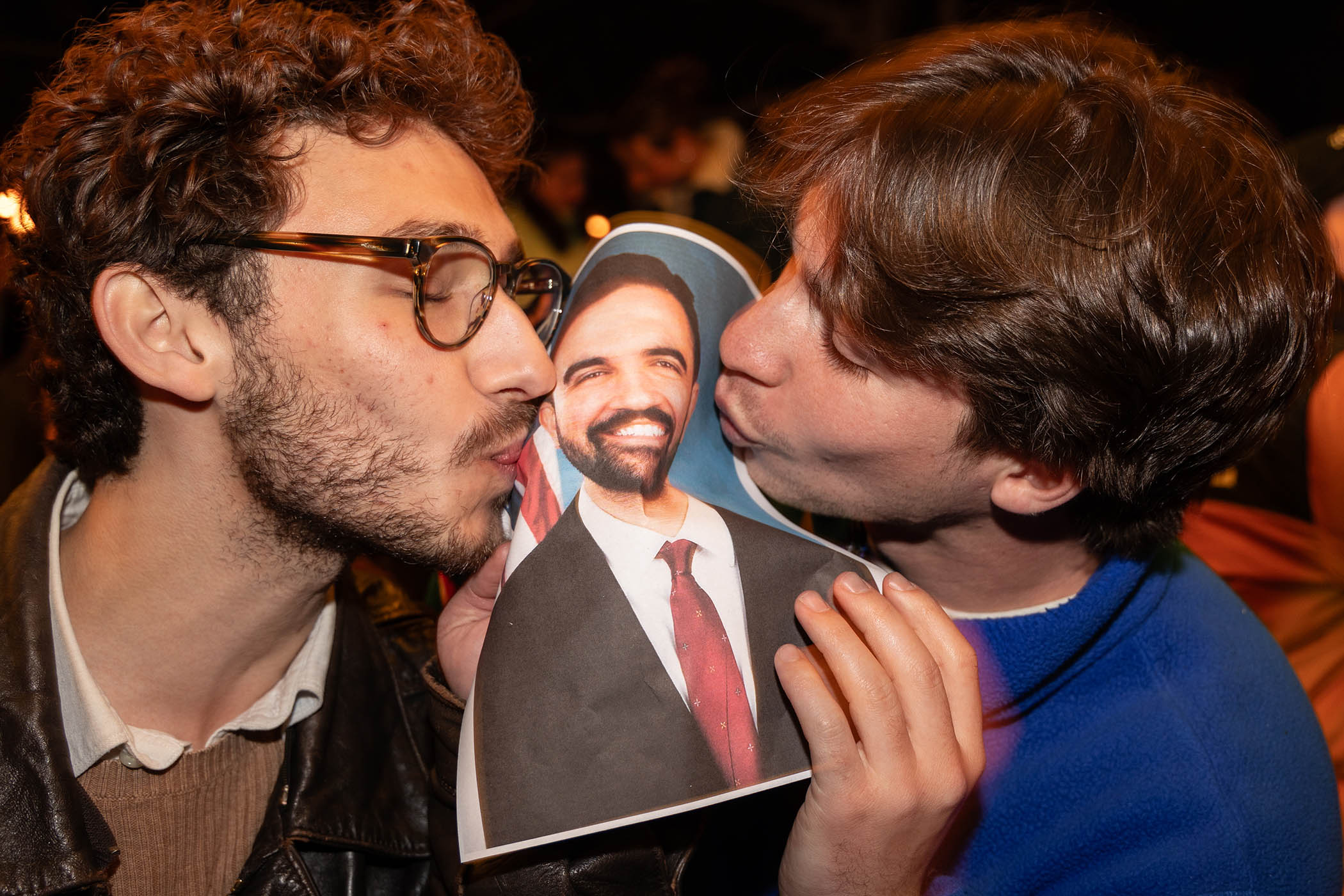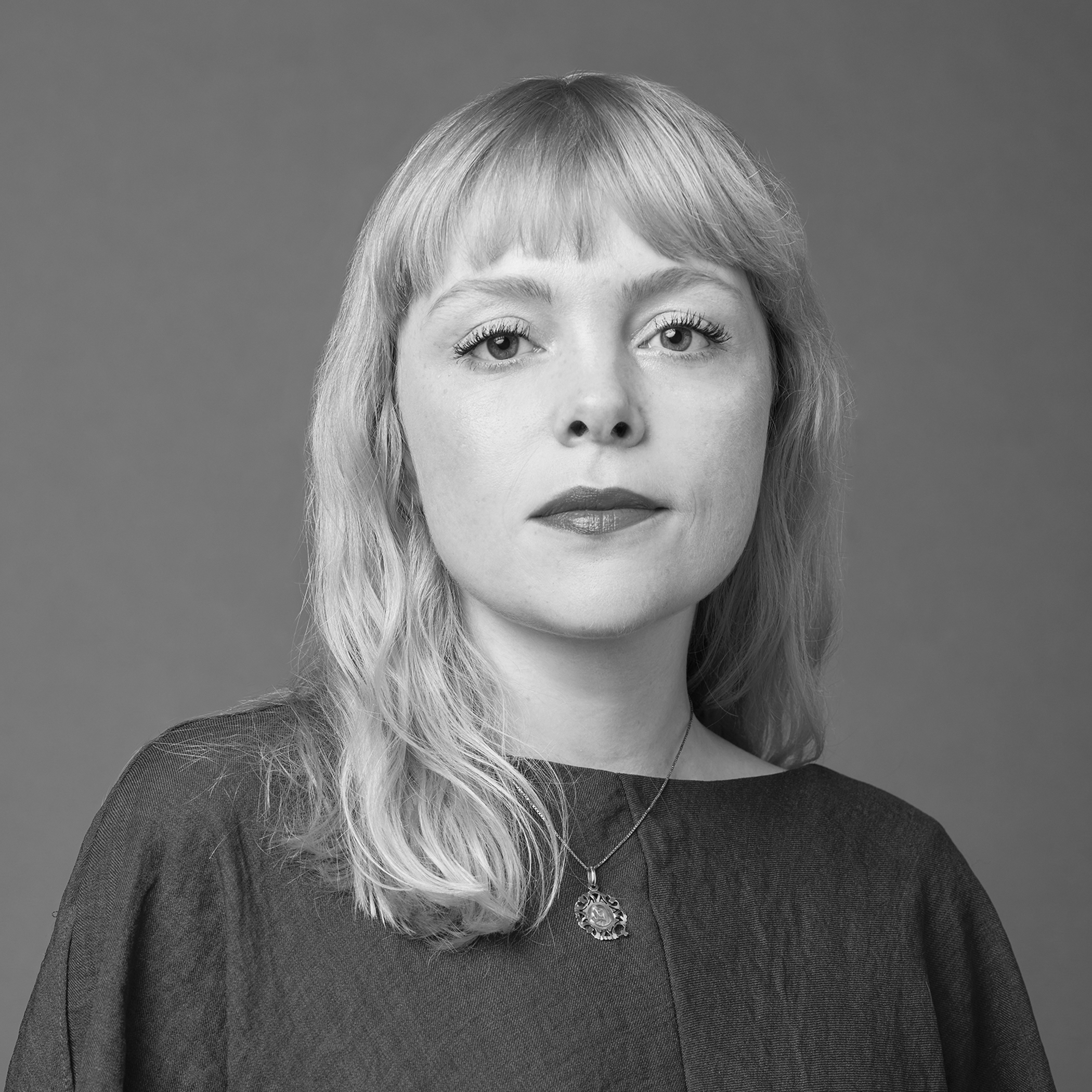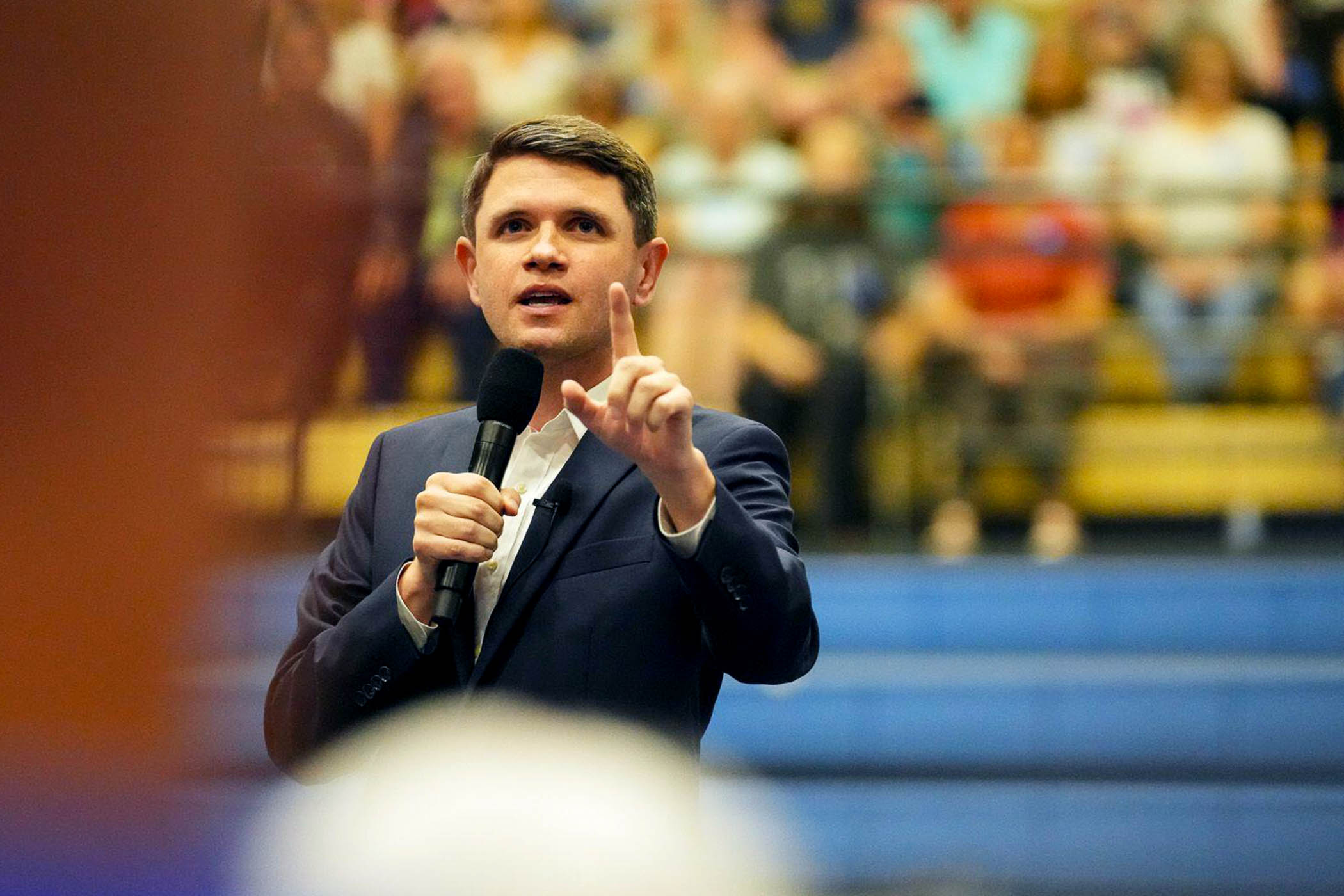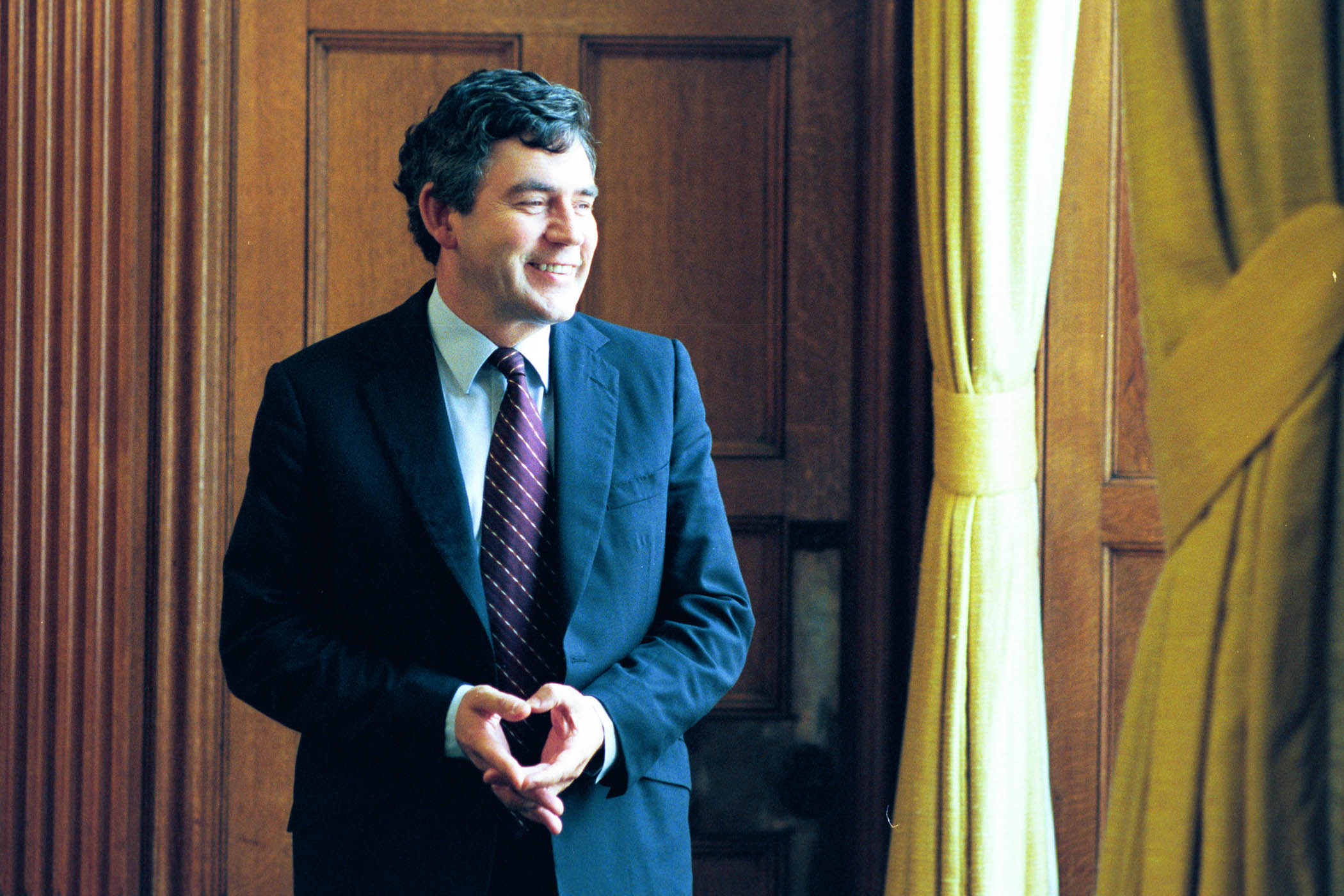Photographs by Andy Hall for The Observer
February was the first time I had some idea of Zohran Mamdani’s popularity. Before that, he had seemed like any other impossible dream man you shouldn’t invest too much in: leftist and handsome and charming. As with many significant cultural shifts, I was able to gauge the momentum behind him through the guys I was speaking to on dating apps. One week, the men of New York had, as usual, plans that mostly involved catching Kurosawa showings at independent cinemas, perhaps going to one of the restaurants on the near constantly published “best 100 pizza spots in the city” lists. The next, they were canvassing for Mamdani. One Sunday, I realised two men I had been out with a few times each were on the same canvass team. I hoped they would remain so focused on rent freezes and free buses that they wouldn’t get chatting about whether they had dates with an Irish woman named Megan lined up in the days to come.
I had been burned enough in the past that my mind and heart defensively rejected the possibility of hope. In a pub in south London, I watched Jeremy Corbyn’s Labour party lose the 2019 general election by such an astonishing and – to us – unforeseen margin that, when I looked around, I saw multiple people crying, then touched my own face and found that I was too. In early 2020, I sat in a friend’s apartment in Brooklyn at a watch party for the Democratic caucus as Bernie Sanders definitively lost the ticket, and a strange atmosphere spread in the room, all of us turning from the screen and downing alcohol, feeling embarrassed that we had hoped for anything at all. Then, a year ago, Donald Trump’s re-election removed any lingering impulse I had to engage with electoral politics.
So the appearance of Mamdani – an unapologetic socialist, an advocate for Palestine, a person who acknowledged that the obscene wealth gap seemingly inherent to New York is perhaps not inevitable – seemed too good to be true. Of course, Andrew Cuomo, the jaded, sneering former governor accused of sexually harassing more than a dozen women would be the mayor of New York. That’s how it had to be. That was the US – and that was life.
In the lead-up to the primary, my best friend, Daniel, went canvassing. Daniel is one of those guys who some people find to be the most charming man on Earth, and from whom others recoil, asking why he never shuts the hell up. So with genuine concern for the potential harm this might cause to Mamdani’s chances, I asked him: “Are you sure you should be doing this?” But he came back from his first day of door-knocking with stories of almost absurd success.
He told me he had spoken to a tired mother and her daughter, a 17-year-old young woman who used a wheelchair, and when Daniel started describing Mamdani’s aims, about affordability and prioritising New Yorkers’ ability to remain in their home city, mother and daughter lit up. This, they said, was the kind of thing they needed to hear and never did. They were excited to vote. When Mamdani won the primary, I texted Daniel. “Cuomo conceded LMAO [laughing my arse off]. Can’t believe it. Something good happening in real life…”
Mamdani’s victory in the primary was built on extraordinary grassroots energy: the average donation to his campaign was $98, compared with Cuomo’s $593, and an unprecedented army of 50,000 volunteers campaigned for him – a number that, by his account, grew to 90,000 before the vote. He has been reaching out beyond his base of educated young leftists to disenfranchised working-class people who have abandoned a toothless and complacent Democratic party – one that has been reluctant to welcome his success. He has maintained a laser focus on his central campaign promise, alleviating the cost of living crisis, even when his opponents try to drag him into bickering about international affairs (Mamdani is an anti-Zionist Muslim and much of the orchestrated backlash against him has been hysteria about supposed antisemitism). Having spent these past weeks following along on a tiny fraction of his breathtakingly packed event schedule, I am certain that the emphasis on affordability has been key to his success. But there is a second crucial component to his rise: dude loves New York City.
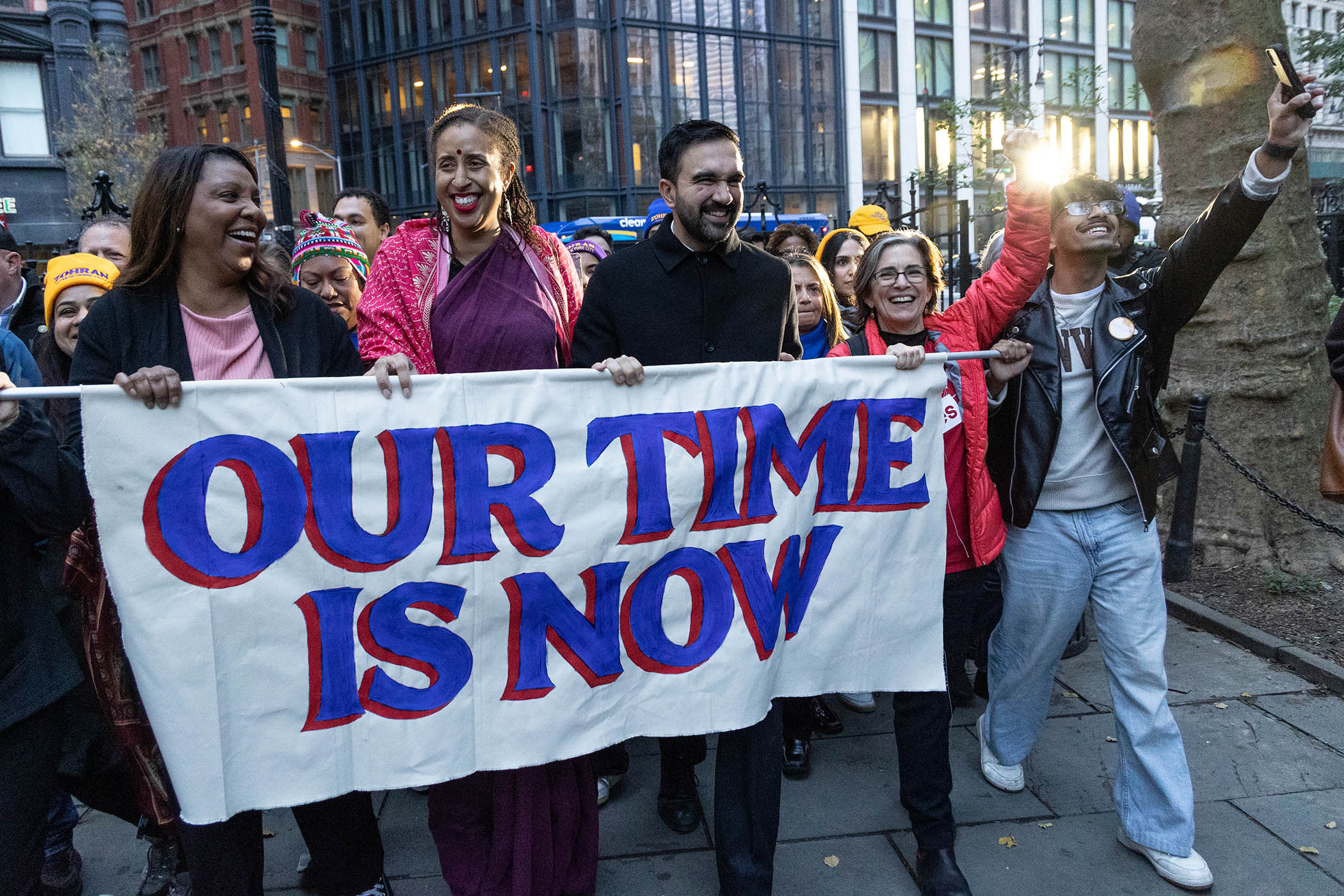
Zohran Mamdani arrives with his supporters to speak at a dawn rally in front of City hall in Manhattan
On a recent Sunday, I travelled to Coney Island, where Mamdani had organised the “cost of living classic”, a day-long, inter-borough soccer tournament held in the Brooklyn Cyclones’ stadium. One lonely red sign on the seafront was for Curtis Sliwa, the eccentric Republican candidate best known for his dozens of cats, starting a citizen’s brigade of crime-fighters who wore red berets, and having been shot while sitting in the back of a yellow taxi, on the order of gangster John Gotti.
Related articles:
As I checked myself in with Mamdani’s press team, three fans in their twenties came over and asked whether there were any scarves left: they had come purely because they had heard there might be Mamdani-branded soccer scarves. No dice. A member of his campaign yelled amiably at the waiting journalists: “If you guys wanted scarves, I’m really sorry, but they’re all gone.” Inside, in the stands, a woman in her 20s who had travelled from the Bronx to support the campaign, asked me not to name her, as her boss, a restaurant owner, hates Mamdani. What compelled her to come out on a chilly weekend evening to show up for him?
“I tried to explain this to my folks recently and it was hard to get out, because some of it is just that he is a real person. When he talks, when I look at him – I see a real person.”
On the pitch, teams from Queens and Manhattan were battling it out, a player understandably yelling at idling members of the press who were spilling on to their territory. Spirits were high, but the crowd was restlessly looking around for Mamdani’s emergence. A few jaded older photographers rolled their eyes about his lateness, but some had brought their pre-teen kids along and allowed them to infiltrate the press area, and they were now excitably shrieking “Zohran! Zohran!” as he emerged. Seeing him in person, I was reminded of a text I had received from my friend Sophie the previous week. “I just saw Zohran in Crown Heights – he is even better looking in person. I feel like an Irish woman meeting JFK in 1960,” she wrote, sending a selfie of herself in his vicinity, looking breathless and feral.
After a brief statement about his love of soccer and his happiness to be there, Mamdani opened up for questions, gesturing to a journalist before me. “Oh, I, I’m not ready,” she laughed, a little flustered. “You should ask somebody else”. There but for the grace of God go I, I thought, but before I could make my own charmed misstep, he was being swept away to take photographs with the soccer players. His staff yelled at us to step back, but forward we inexorably went, dozens of us crowding him and jostling each other until, finally, the announcer ordered us all off the pitch. Security was tight; fans in the stadium were unable to get down where Mamdani had posted up against the barriers, and a crowd of 10-year-old boys from a Ditmas Park sports club were nimbly jumping around in their seats with excitement. “Low-key, can we please get on the pitch?” one of them asked me.
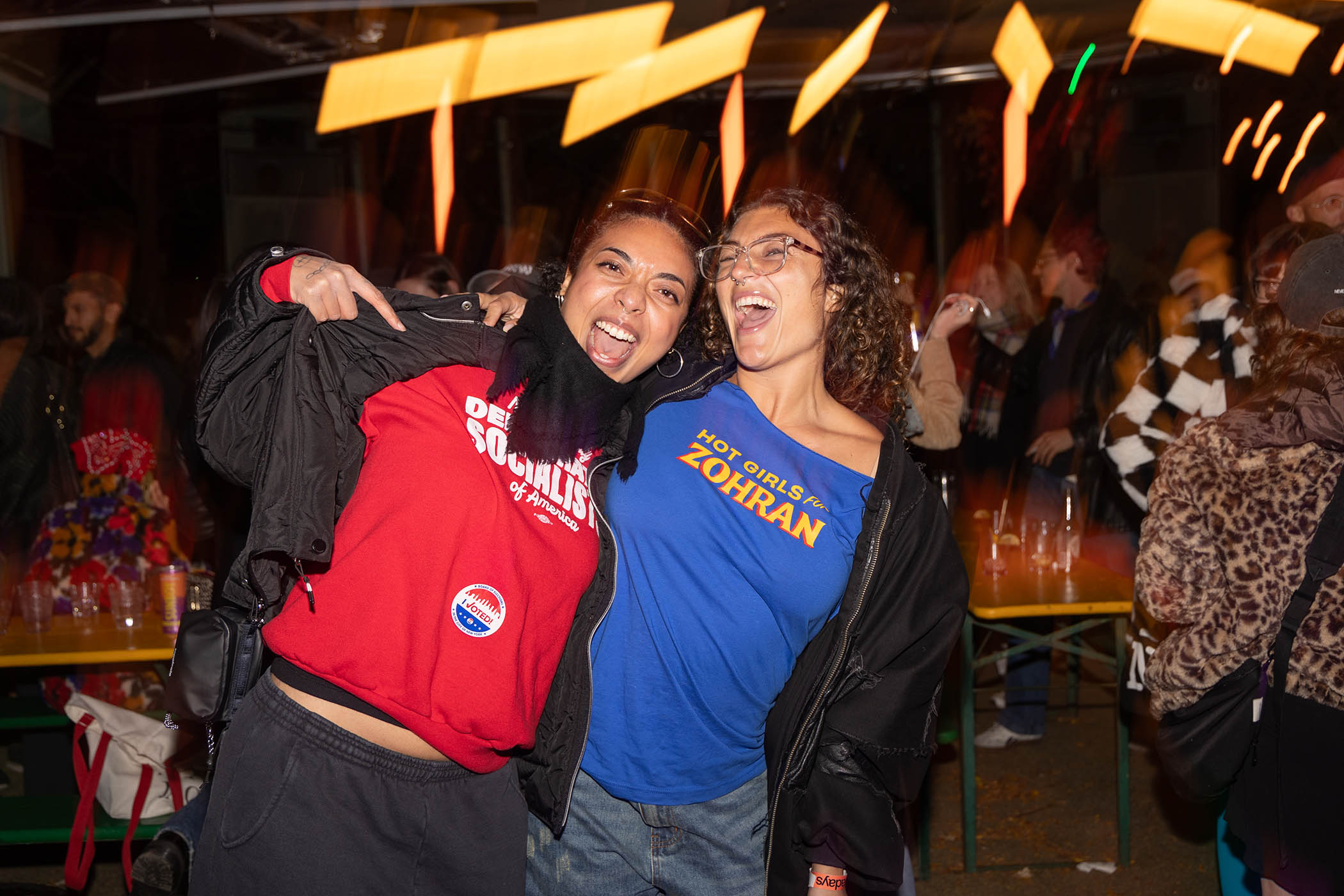
The Hot Girls for Zohran movement struck a chord with educated young Brooklynites
All around Mamdani was an aura of giddiness; teenagers bursting into nervous laughter when he shook their hands, a player in the winning football team shouting at his friends to ask: “Was Zohran watching our game? Did he see?” Back in the summer, Mamdani had been responsible for another moment of communal euphoria when he organised a city-wide treasure hunt that thousands of New Yorkers participated in. Derided as an example of his insubstantiality by detractors, it seemed to others a neat example of what was working: a politics of abundance, of pleasure and joy, instead of fear and threat. Cuomo’s campaign, like that of the city’s incumbent mayor, Eric Adams, was largely predicated on presenting New York as a perpetually dystopian hellhole – one that will descend into true anarchy if a socialist is put in charge. Fear may be an effective political weapon, but it is also a wearying one. “We have spent too long trying not to lose,” Mamdani said in an October rally speech. “Now it is time to win!”
When I spoke with a fellow novelist friend about his campaign, we acknowledged the inevitable failure of achieving all his proposed policies. But we likened his process to that of any creative act; there is an ideal in your mind at the beginning, and though it never turns out as you first imagined, if the ideal was a good and true one, you end up making something worthwhile in the act of trying, even if it is quite different from what began the conception.
My friend Claudia, a campaign volunteer, wrote on X in June, “among its many merits, Zohran’s campaign is the campaign of true joy – anchored to it, steeped in it, generating more of it – not to obscure weak points or trick people but because that is just what truly fighting for others does, immutably”. In another post, Claudia thanks the campaign for making accommodations so that she could safely volunteer for it.
Claudia lost her partner, Ryan Carson, in a horrific random act of violence on the street in Brooklyn two years ago. Carson was murdered by a teenager while he and Claudia waited for a bus home after attending a wedding. Her nightmare did not begin or end with that unthinkable event, which continues to be relentlessly exploited by online trolls and far-right tormentors. Because Claudia and Ryan were leftist members of Democratic Socialists of America, the most sordid corners of the internet taunt her that she and Ryan deserved what took place; they lie that she refused to cooperate with the police and accuse her of any number of fictional sins, in between calling for her death.
Claudia is a member of a terrible, small club: the people who have experienced the absolute worst of New York. Nobody could blame her if she chose to denounce the city, or simply abandoned it. Instead, Claudia’s ideals, her dedication to creating a better New York, have not just persisted but strengthened. Claudia’s story could serve as a microcosm of Mamdani’s campaign: the refusal of cynicism and doom-saying in favour of an unlikely – and in her case heroic – commitment to optimism and community.
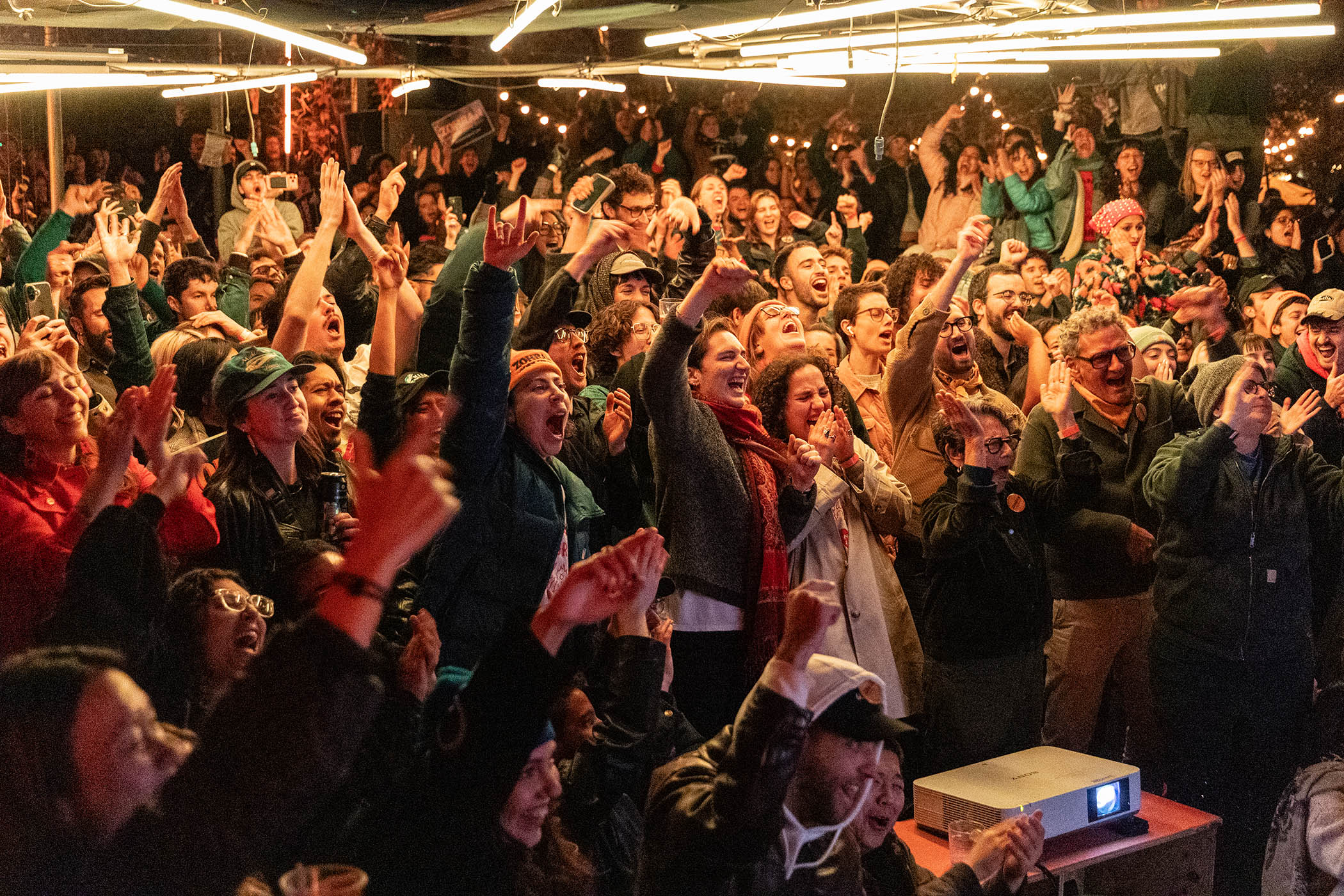
The Mamdani faithful celebrate his victory at a Brooklyn nightclub
On one of those crisp Manhattan mornings which make paying 80% of your income in rent feel almost worthwhile, I walked into SEIU 32BJ, the headquarters of a union that mostly represents building workers. A number of union chapters had gathered to meet Mamdani for what he had described as a “reverse town hall”, a chance for him to ask questions. The night before, he had debated Cuomo and Sliwa, and I had marvelled, walking around 14th Street to find a spot to watch it, to see so many bars showing it on their corner TVs instead of sport. He had crushed it: Cuomo’s sour dissatisfaction reading almost as boredom, Sliwa’s charismatic insanity leavening proceedings, allowing Mamdani to appear the only grown up in the room, and certainly the only candidate you could possibly conceive of hanging out with.
I landed in a dive bar, where, every time one of his opponents mispronounced “Mamdani” (which at this point was seemingly deliberate; it’s three phonetic syllables), those watching the TV screamed their jubilant correction. “M. A. M. D. A. N. I! Get it right, honey!” yelled one wasted patron, echoing one of the most iconic moments from the primary debates, when Mamdani told Cuomo: “I have never had to resign in disgrace. I have never cut Medicaid. I have never stolen hundreds of millions of dollars from the MTA [Metropolitan Transportation Authority]. I have never hounded the 13 women who credibly accused me of sexual harassment. I have never sued for their gynecological records, and I have never done those things because I am not you, Mr Cuomo. And furthermore, the name is Mamdani: M. A. M. D. A. N. I – you should learn how to say it.”
Upstairs at 32BJ, the various chapters sat around a huge roundtable and eagerly awaited Mamdani’s arrival. In he bounded. I was sitting next to a union leader named Aaron and I appeared to be a noble organiser instead of a lowly writer; I am ashamed to say I accepted the stolen valour of Mamdani’s beaming handshake. Caught up in the moment, I startled to hear myself whooping along with Aaron as Mamdani praised labour movements and expressed his admiration for those in the room, some of the workers having joined in the 1970s and some as recently as two weeks ago.
He listened as doctors described broken-down lifts in their hospitals, teacher’s aides receiving salaries of $30,000 a year, and one security woman telling him that her daughter, born and raised in New York, had been priced out so severely despite working full-time that she had to move across the country: “Mr Mamdani, I want my daughter back,” she told him.
“We want your daughter to come home,” he said. “We will make this city a place your daughter can afford to live.”
Several of the dozens of workers interrupted themselves to tell him how proud they were to support a candidate embedded in labour organising. “We have unions to thank for so much,” he said. “New Yorkers have the weekend because of unions. New York is always portrayed as the city of hustle, but New Yorkers also need to rest.”
“That’s right, say it,” murmured Aaron.
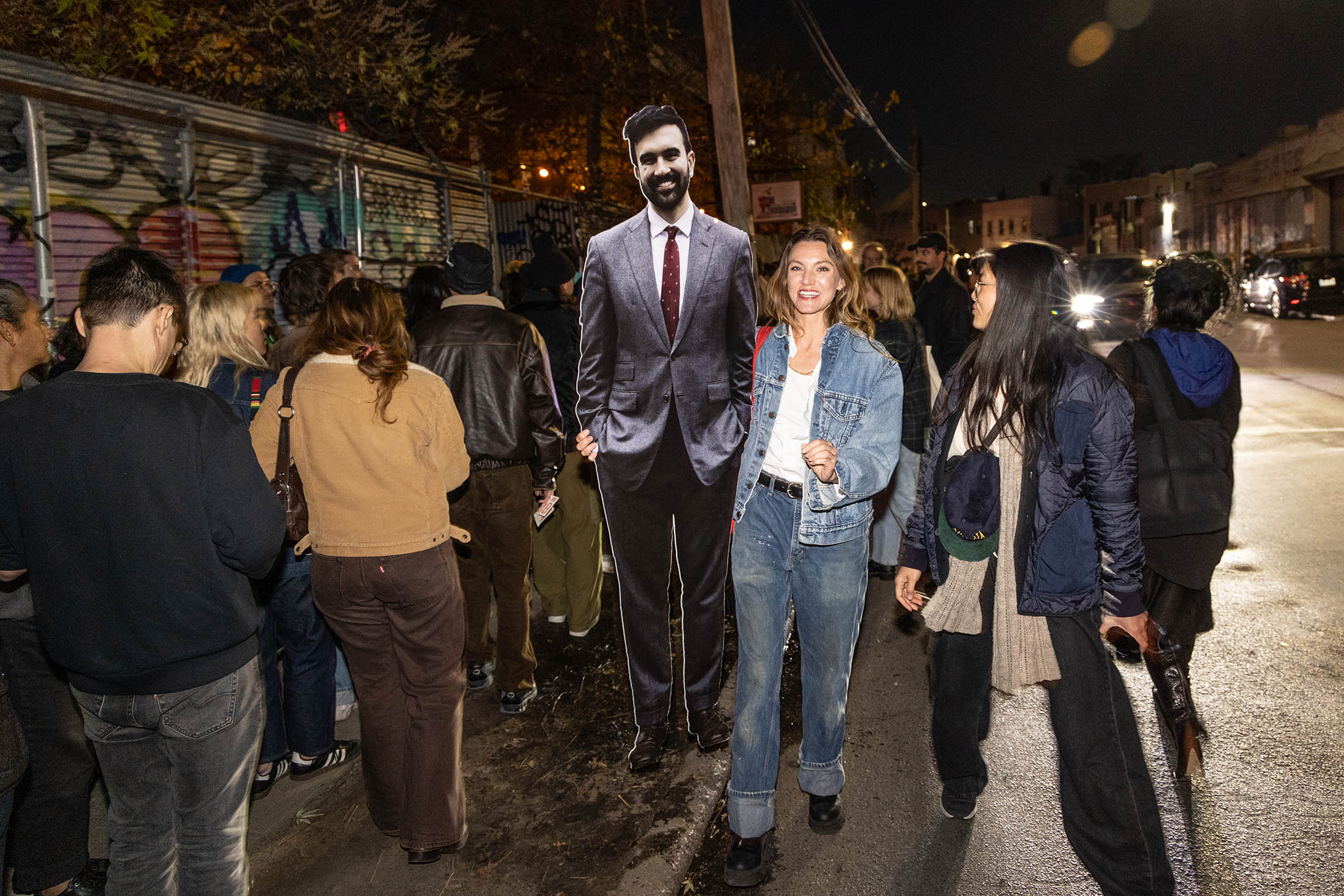
Supporters on the streets
The night before Halloween, Hot Girls for Zohran threw a party. Hot Girls for Zohran is a grassroots initiative, unaffiliated with the official campaign but happily endorsed by the man himself (the model and actor Emily Ratajkowski posted a selfie with him in which she was wearing one of the group’s ubiquitous shirts). Its events struck a chord with the demographic Mamdani is most successful with, educated young Brooklynites.
At the Hot Girls Halloween party, hosted at a hip Bushwick hotel, I saw several Charli XCX costumes beside someone dressed as Sliwa in his signature red beret, and spoke to a couple – tech workers – who had moved from San Francisco. They, like many others at the party, told me that they had canvassed during the primary but less so for the general election: “Greenpoint is overrun,” the woman told me. “They literally are begging us to stop showing up there.”
Not everyone was there with earnest civic-minded intentions; an overconfident young man finishing his PhD approached me as I bought a $15 “Hot Girl elixir” – vodka, lime and cranberry. I asked what brought him to the party and whether he had campaigned for Mamdani. “No,” he said. “I just saw someone I knew was going and that it had ‘Hot Girls’ in the title. Anyway, what’s your situation?”
Well, I told him, I have a boyfriend and he has two children I’m helping him to take care of.
“If you ever want to adopt another little boy, you know where to find me,” he said, creeping me out so badly I took my leave into the rainy evening, where multiple photographers and podcasters roamed.
On Sunday, the final day of early voting, I joined a canvassing team in Crown Heights at a polling station, where it was asking passersby whether they had made a plan to vote. Unbidden, several attractive, smiling young couples yelled out that they had already voted. “Well, they didn’t say who they voted for, did they?” said our photographer Andy, laughing: it was comically obvious that they were for Zohran. Amid the abundant Mamdani supporters, there was a sole Cuomo canvasser holding leaflets, not even attempting to hand them out. “Hello, I’m a journalist – could I ask you a few questions?” I asked her brightly.
“No,” she said, staring straight ahead.
“Do you like Cuomo, then?” I persevered.
“None of your business,” she said.
I had read a growing number of reports suggesting that some of Cuomo’s canvassers were being paid. They had, apparently, not been persuaded by the reported $33 an hour to feign much enthusiasm.
Newsletters
Choose the newsletters you want to receive
View more
For information about how The Observer protects your data, read our Privacy Policy
On election night the press line outside Brooklyn Paramount, where the campaign’s official watch party was held, went around the block. An excited woman in her late teens came over and asked if I thought there was any chance she would be able to get in, which there definitively was not.
“That’s OK,” she said wistfully, “I just live across the street, and I voted for the first time today. I can’t believe he’s going to be right here.”
All through my time following the campaign I had encountered these moments, people who spoke of Mamdani with reverent adoration. Another journalist and I swapped anecdotes that we had omitted from our pieces, for fear they would read like corny propaganda.
Inside the Paramount, a grand former movie theatre built in the 1920s, Mamdani’s supporters began to pour in. I had spent the day marinating in Cuomo supporter content, which had left me so anxious about an upset that I had said an actual prayer on my way. Despite the polls having remained in Mamdani’s favour, some of his opposition predicted that the quiet Cuomo contingent would come out in the campaign’s final innings. It was enough to introduce a sour note of doubt: I had been here before, felt similar excitement, and had been devastated. Most of Mamdani’s supporters were plainly elated, though, even before polls closed, and many of them exhausted from the final push. A teacher told me that alongside his actual job, he had been canvassing for hours every night for weeks.
Just after 9.30pm I spoke to Anthony Di Mieri, one of the team responsible for the campaign’s exceptional videos, moving and wry and funny, and asked how he was doing.“I feel insane,” he said, and just then a wave of euphoria whipped through the crowd and Anthony and I both spun round to the screens. They had called it. Zohran Mamdani, 34 years old, a Muslim and a socialist, was the next mayor of New York City. I burst into laughter.
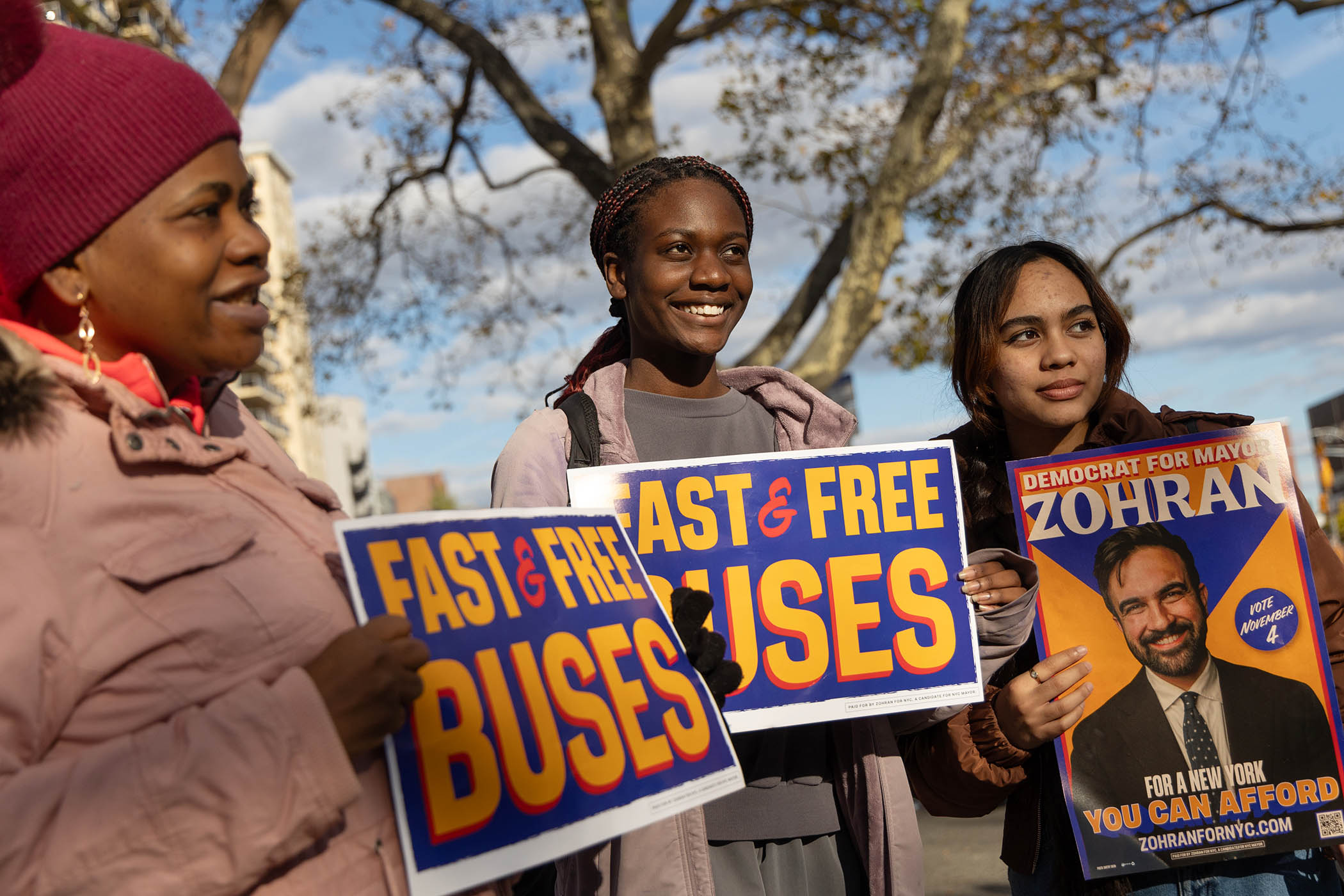
Mamdani supporters in the bourough of Queens attend a last-minute canvassing rally
“Someone check on Debra Messing,” a guy in the crowd yelled, referencing the actress who had posted over 100 Instagram stories on polling day, warning that New York was on the verge of electing a jihadist.
I saw my friend Claudia, radiant in a red gown, dazed, and congratulated her. Everyone was congratulating one another, I realised. In the course of the campaign, billionaires had donated immense amounts of money to anti-Mamdani and pro-Cuomo PACs. Michael Bloomberg donated $13m, Bill Ackman $2m, Joe Gebbia the founder of Airbnb another $2m. But this time the combined power of capital and the numbing effect of a Democratic party who were obsessed with flogging the same tired default option, were not in fact unassailable. Claudia took out her phone to liaise with friends and I saw that a photo of Ryan, her late partner, was the wallpaper picture.
Mamdani took the stage. It was true that what had happened in the campaign would eventually only be judged by what is to follow. For now, it was enough to have confirmed that conceiving of a radically different alternative was still a material possibility in this world, even when every status quo system had tried its best to insist it wasn’t.
“Thank you, my friends,” he began.
Megan Nolan is a journalist and author based in New York. Her latest novel, Ordinary Human Failings, was shortlisted for the Orwell prize
